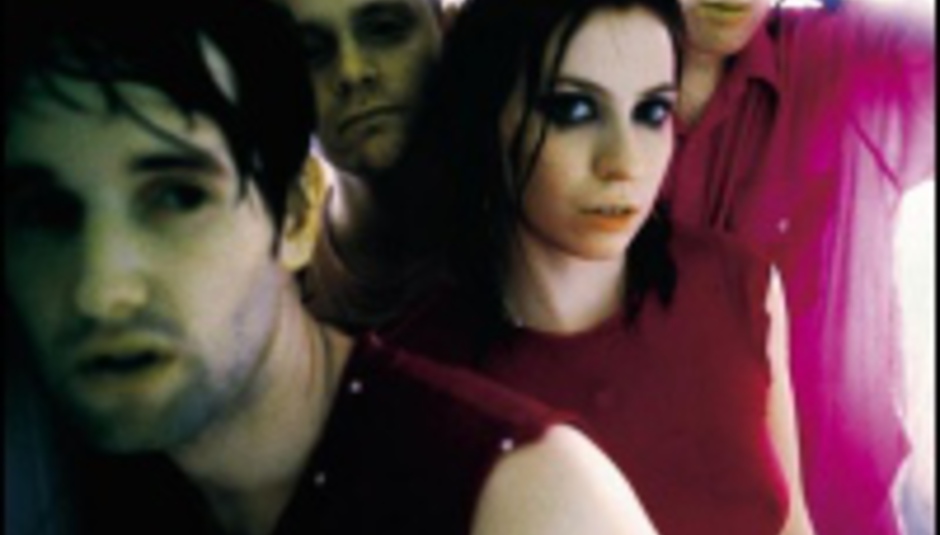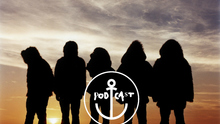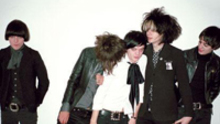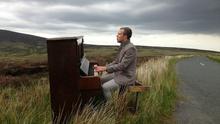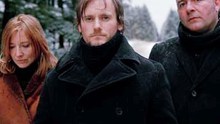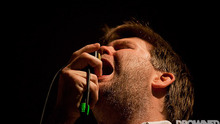The fact that said album ‘Meltdown’ is possibly their most direct and in-yer-face rock and roll record is adamant proof that like a fine wine, maturity doesn’t have to be synonymous with boredom and complacency.
I caught up with singer/guitarist Tim Wheeler and bass player Mark Hamilton before the first date of their current sell out tour at Nottingham’s Rock City.
So how does it feel being mentioned as one of the few survivors of the Britpop era? I mean, you’re all still in your mid-twenties so it must be quite surreal being called veterans.
Tim: I guess that apart from us there’s only Supergrass who’ve kept the same three original members all the way. Even the big guns Blur and Oasis have had numerous changes in their ranks. It’s pretty scary being a veteran, slightly weird that not many of our contemporaries are still around in fact. At the same time it’s good on our part that we managed to stay the course. I don’t think people expect bands to last very long these days.
It must be strange though having already made one ‘Greatest Hits’ record at your age. Can you see ‘Intergalactic Sonic 7”s Volume 2’ appearing 10 years from now?
Mark: Well, it’s early days yet. I’ll be 37 in ten years time so you never know, but at least I’ll still be younger than The Darkness are now!
Obviously you’ve had different experiences making each of your albums, but if you were to pick the one which has given you the most satisfaction to make, which would you choose?
Mark: I think I’d have to say ‘Meltdown’ simply because it was the latest one we recorded, and you always aim to improve on your last record, which I think we’ve done.
Tim: ‘Meltdown’ was definitely our easiest to make. It was probably the most relaxed we’ve ever been working in a studio. It’s hard to say which one is the best though. I’d say ‘Nu-Clear Sounds’ was our least favourite one, for sure.
Mark: I mean, I still get a thrill out of listening to ‘Trailer’. It was the first time we’d ever recorded in a proper studio and the results still sound amazing to this day…
Tim: … it’s the same with ‘1977’ as well.
In what way was ‘Meltdown’ the most “relaxed” album to make? For a record with such a heavy sound, “relaxed” seems an odd description.
Tim: I think it’s because we seemed to know what we were doing with this record and the songs came together more easily. We had a sound that we wanted to take throughout the album and we hit the right note as soon as we started playing it. I think ‘Meltdown’ is more like our live sound, possibly the closest representation we’ve ever got to how we play on stage. I remember recording ‘Girl From Mars’ and ‘Goldfinger’ for ‘1977’, and when we played it back it wasn’t quite how I imagined us sounding. I mean, it was great but it kinda took us to two different places – one how you are in a studio and another how we sound playing live. I guess with this record, it feels like going back to where we started, in that the songs came together live rather than in a studio.
Do you feel more comfortable playing in front of your fans to recording in a studio?
Tim: I dunno really. I guess they’re both such different entities.
Mark: I’m quite happy with them both really. I think over the years we’ve spent more time on the road and the following we’ve built up along the way is the main reason we’re still around today.
Tim: For me it’s like, “the grass is always greener on the other side…”, in that when I’m recording I can’t wait to get out on the road and when I’m on the road I tend to start writing new things and so I’m itching to get back in the studio to try them out.
What influenced the songs on the new album? For example, ‘Orpheus’ isn’t actually mentioned at any point during the song while the verse and chorus sound like two entirely different compositions stuck together.
Tim: Well the song itself is taken directly from the Greek myth of the same name, but it also tells the story of a friend of mine whose mum had just died one summer, and he was just trying to get through it. It’s mainly about someone who’s been through hell and now trying to get out the other side, whilst trying not to look back. We had an original version of the song that wasn’t half as complicated as it turned out in the finish, but then we stuck in this whole intersection and a middle break and the record label were going “it’s not going to work” and we were like “IT WILL!” …
Mark: We knew we had to make it work because both parts of the song were completely different and we had to find the middle ground.
Tim: In the end ‘Orpheus’ turned out to be the birth of the new Rick (McMurray, drummer) because he knew he had to really push himself on that song to make it work – more than any of us in fact – and he nailed it after a few days. I suppose looking back ‘Orpheus’ does sound a bit like a hatchet job doesn’t it?
My favourite song on ‘Meltdown’ is probably ‘Starcrossed’. Which ones were you most pleased with at the end of the recording sessions?
Tim: You’ll be pleased to know ‘Starcrossed’ is coming out as our next single then. I think ‘Vampire Love’ is probably my favourite song on the album, but I don’t think it’s single material.
Mark: With me I think I like the more complicated stuff on the record such as ‘Orpheus’ and ‘Renegade Cavalcade’.
The first single from ‘Meltdown’ was ‘Clones’, which was an Internet only release. Do you feel that the Internet is fast becoming the best medium for which to promote and listen to music rather than the good old high store record shops?
Tim: I think it depends really. If people are going on file sharing sites and downloading the finished version, or worse even, what they BELIEVE to be the finished version of your album before it goes on general release and then sell it on to our fans it goes against the principle of what the internet is about in terms of downloading music.
Mark: I think that if you are a fan of an artist you would actually feel better paying for the download directly from the band because you’d be more appreciative of the work that went into making that record.
Tim: And it is also much cheaper for the customer than paying £3.99 or whatever for a CD.
Mark: It cuts out all the middlemen and distribution people so for something like 99p you’re still getting the single and artwork directly from the artist. We’ve always tried to encourage our fans to download stuff from the official website by giving them loads of live stuff, and then obviously with ‘Clones’ it was like an exclusive preview of our new stuff before anyone else got hold of it so we try to give value for money in that aspect. I think if you encourage them in that way they’re more likely to buy the album because they won’t feel ripped off or exploited at any point.
Tim: The Internet is a good medium for giving away both free and paid downloads provided its done in the right way. As a record buyer, I prefer to pay for downloads rather than go out to the shops and buy singles because it's more convenient to just download the song and put it on your iPod and it's there forever or as long as you want to hear it.
What about the promotional videos that you’ve made to accompany your singles? In terms of indie/alternative bands, Ash seem to have a larger budget than most. Would that be a fair comment to make?
Tim: We just brainstorm ideas really and then take them to the record company.
Mark: We’ve got this guy Geoff Thomas who’s made the last six or seven videos actually. We just give him a list of ideas and then he’ll go and expand upon them and come back with the treatment.
Tim: That’s why we call it ‘the treatment’ – because when he comes back he makes our ideas look so much better. In terms of cost our last few videos have been around the £50,000 mark, although saying that ‘Clones’ was more like £15,000. It’s hard to say whether we’ve spent more on videos than most of our contemporaries to be honest.
Do you feel that making videos is as important in 2004 as it was ten years ago in terms of selling records?
Mark: I would say its more important now because nearly everybody has access to digital television which hosts a number of music programmes crossing all genres so the chances are you can appear on up to 12 channels per day with one video. A lot of music fans now don’t bother listening to the radio because there are more specialist music shows on TV. You can stick on Kerrang! TV or The Amp or MTV2 and listen to exactly the type of music your into, and watch the artists’ videos at the same time, so you end up getting more exposure than you’ve ever had in the past.
You’re actually going to be spending the majority of the next four months on the road with the tour and then most of the summer festivals. How do festival appearances compare with playing your own shows?
Tim: Well again, we’ve built up a healthy reputation through our appearances at festivals in the past, and that has probably won us a number of new fans along the way.
Mark: For me I like playing the European festivals and the ones in Japan just as much, if not more, than playing anywhere else, just for the fevered sense of fanaticism that goes with them.
And what about the ‘Pop Beach’ festival in Great Yarmouth? You’re one of the few bands who’ve successfully made that crossover between the indie/rock circuit and teenage pop arena. It must be strange rubbing shoulders with the Pixies and U2 one minute and then playing in between Girls Aloud and Westlife the next.
Tim: We actually started doing the pop festivals as an experiment for our record label, Mushroom. The worst thing about some of these shows are that you have to mime throughout, which is something none of the band are really that comfortable with.
Mark: It’s really embarrassing just standing around pretending to play bass like some gimp when the thing’s actually not plugged in! I think the reason Mushroom were so eager for us to get involved on this circuit was that it ensured our singles got onto the Independent Local Radio station playlists, which apparently contributes to most single sales in the UK.
Tim: I think Great Yarmouth is the only one we’re doing this year, and I don’t have to mime when I’m singing…
Mark: … unlike the rest of the band!
Tim: Yeah but it’s the only one.
Do you think that the people who watch you at these kind of events see you as Busted’s older brothers (and sister)?
Tim: Well, I don’t really know that much about Busted except that it’s marketed for kids. My 10-year-old nephew thinks they’re great, so I suppose in that aspect they serve a purpose.
Mark: Its good that they’re giving a different angle on pop music. I suppose they are the new face of boy bands but they’re not as trite as Westlife miming some version whilst sat on five stools. It’s better that kids get into some form of guitar music at an early age rather than that.
Tim: If people eventually get into Ash records via Busted then we’re all fine with that, and if they see us as Busted’s Greater Uncles then even better!

